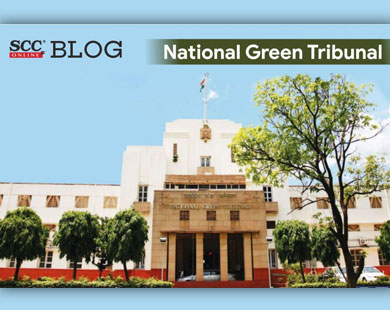National Green Tribunal | A bench comprising of Adarsh Kumar Goel (Chairperson), Sudhir Agarwal (Judicial Member), JJ., and A. Senthil Vel (Expert Member) held that the timeline laid by Supreme Court in Paryavaran Suraksha v. Union of India, (2017) 5 SCC 326 to handle liquid waste cannot be extended by this Tribunal.
The State of Karnataka filed an application for modification of order dated 10-10-2022 by this Tribunal where the Tribunal took suo motu cognizance based on media report “Lakes of Bengaluru: Industrial effluents, raw sewage; stinky tale of Chandrapura lake” stating that damage is done to Chandrapura lake and statutory regulators failed to take remedial action. The media report also mentions that the buffer zone of the lake has been encroached upon and waste is being dumped into the lake. The Tribunal considered the report and action plan submitted by joint Committee comprising of CPCB, State PCB, 2 Indian Institute of Science, Bengaluru, SEIAA, Karnataka, National Wetland Committee, State Wetland Authority and the District Magistrate, Bengaluru.
The Order dated 10-10-2022, stated that the report filed by the Chief Secretary shows the poor state of the lake. According to the report nearly two acres of the lake in Chandapura town has been encroached by construction activities and one of the major pollutants of the lakes in the region is the mushrooming of Red Category industries (industries having pollution index score of 60 and above) in the Jigani Bommasandra industrial area and discharge of effluents into lakes in violation of the zero liquid discharge (ZLD) policy of the government i.e. no untreated water is supposed to be released into lakes.
The Order directed the State of Karnataka to pay compensation of Rs. 500 crores for the “significant loss of environmental services of the lakes” and the amount must be utilized for restoration measures of the lake within six months as per directions and supervision of a Monitoring Committee headed by the Chairman, State Wetland Authority.
The State contended that it would take 3-4 years to take the remedial measures and it is not justifiable to deposit Rs. 500 Crores immediately as the amount is to be spent in 3-4 years.
Negating the applicant’s contention, the Tribunal stated that the State Authorities had not only violated the statutory mandate but also the violated the timelines laid down by the Supreme Court in Paryavaran Suraksha v. Union of India, (2017) 5 SCC 326 to handle liquid waste.
The Tribunal opined that the timeline laid down by the Supreme Court cannot be extended by this Tribunal. The Tribunal stated that the contention that the amount is to be spend in 3-4 years therefore there is no liability to be accrued is not acceptable because the liability for compensation has already accrued as the violations have already taken place, including the violations of direction of Supreme Court in Paryavaran Suraksha (supra) to handle liquid waste. The Tribunal stated
“Liability for compensation has already accrued, which is in addition to continuing financial liability for future violations for many years as proposed by the State and prosecution and other coercive measures, in terms of judgement of the Hon’ble Supreme Court and the statutory provisions under the Water (Prevention and Control of Pollution) Act, 1974, and the Environment (Protection) Act, 1986.”
[In re: News item published on 21.11.2021 in the Indian Express titled “Lakes of Bengaluru: Industrial effluents, raw sewage; stinky tale of Chandrapura lake”, Original Application No. 324/2021, decided on 30-11-2022]
Advocates who appeared in this case:
Mr. Darpan KM and Mr. Rajat Jonathan Shaw, Counsel for the Applicant;
*Ritu Singh, Editorial Assistant has put this report together.







